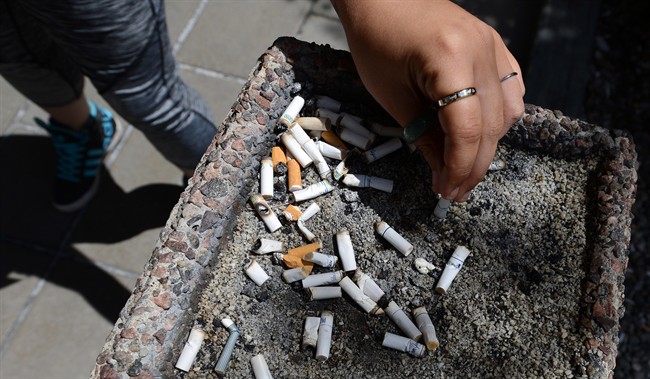Social smokers might not worry about their lungs but what about their hearts? New research is warning that sometime-smokers who don’t light up regularly still end up with the same risks for heart disease as people who smoke every day.

Social smokers grapple with the same elevated risks for high blood pressure and high cholesterol as their counterparts who smoke daily, Ohio State University scientists suggest.
“Not smoking at all is the best way to go. Even smoking in a social situation is detrimental to your cardiovascular health,” Dr. Kate Gawlik, a clinical nursing professor and study lead author, said in a statement.
“One in 10 people in this study said they sometimes smoke, and many of them are young and already on the path to heart disease,” she said.
READ MORE: If you’re going to do one thing for a healthier 2017, choose one of these
Gawlik says her findings are the first to look at blood pressure and cholesterol in social smokers. It’s based on a large study that looked at 39,555 people – more than 10 per cent of study participants labelled themselves as social smokers, meaning they don’t smoke every day.
Another 17 per cent called themselves current smokers, who lit up at least once a day.
Among current and social smokers, 75 per cent had high blood pressure and roughly 54 per cent had high cholesterol.
Once the researchers adjusted for demographics and biometric differences between the smokers and non-smokers, they say they found “no difference” for risk of hypertension and high cholesterol.
READ MORE: Smokers who quit before 40 save a decade of their lives, study suggests
Social smokers also tended to be younger – between 21 and 40 – male, and Hispanic.
With their findings in tow, Gawlik’s team is recommending that frontline health-care workers should start identifying social smokers.
In the study, social smokers were defined as people who don’t smoke daily, but smoke in certain social situations often, such as while going out for drinks with friends, or catching up with co-workers during a break.
READ MORE: Woman featured in graphic anti-smoking ads dies of cancer, hailed as hero
Instead of asking if patients are smoking, doctors should ask if they smoke cigarettes or use tobacco at all whether in social situations, at work events or at family gatherings.
“When was the last time you had a cigarette or used tobacco?” could be another question that doesn’t make patients label themselves as “smokers” or “non-smokers.”
Keep in mind, there were limitations to the study: For starters, participants volunteered instead of being randomly selected and they reported their own smoking habits while scientists checked for blood pressure and cholesterol. Sometimes readings can spike after someone smokes without being regularly elevated, or in other cases they could have chronic high blood pressure because of other underlying conditions.
The long-term effects of smoking weren’t considered, only hypertension and cholesterol, both markers for heart disease.
This isn’t the first time scientists sounded the alarm on social smoking. Last year, the U.S. National Institutes of Health said that long-time, low-volume smokers – those who smoke an average of less than one cigarette a day over their lifetime – have a 64 per cent higher risk of dying from a respiratory disease than non-smokers.
READ MORE: How health officials helped 120,000 people quit smoking
People who smoke between one and 10 cigarettes per day increase their risk of dying by 87 per cent compared to people who have never smoked. But there is a silver lining: across the board, risk fell once smokers quit for good.
“Light smoking and not smoking every day are perceived by many to be effective strategies for reducing the health risks associated with tobacco use, but results from a new study appear to confirm that there is no safe level of exposure to cigarettes,” the study’s lead author, Dr. Maki Inoue-Choi, said.
Gawlik’s full findings were published in the American Journal of Health Population.
carmen.chai@globalnews.ca
Follow @Carmen_Chai




Comments